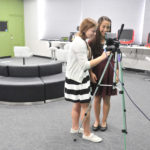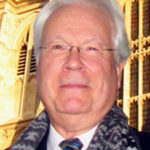
Connie Mutel talks about one of her ecology books during a virtual Lunch and Learn session April 6.
By Lindsay Steele
The Catholic Messenger
When it comes to facing ecological challenges in Iowa, exacerbated by climate change, “We know what to do; we just have to get going.” Ecologist and author Cornelia “Connie” Mutel shared this message during a virtual diocesan Lunch and Learn session April 6.
People are more likely to accept and take action on climate change and ecological issues if they are aware of the local impact and have hope for a solution, she observes. “Many people don’t see these problems as problems. I didn’t until I started (writing about them) and learning a lot more.”
Mutel is a retired senior science writer and archivist for IIHR-Hydroscience & Engineering, a unit of the University of Iowa’s College of Engineering. She and her husband, a University of Iowa emeritus astronomy professor, live on 18 acres of oak-hickory woodland near Iowa City that they are working to restore to biodiversity and health. She writes and edits books on Iowa ecology and the local effects of climate change.
She recently edited a book, “Tending Iowa’s Land —Pathways to a Sustainable Future,” with essays from 28 ecological experts in Iowa. The book takes a personal, “upbeat” look at the ecological issues Iowa is facing, including loss of soil, water, air and biodiversity.
Climate change has magnified these issues, Mutel said, noting that Iowa’s atmosphere, on average, is one degree hotter than it was 40 years ago, causing more intense rain, wind, erosion, flooding and water pollution. In that time, yearly precipitation has increased by 30 to 36 inches. Iowa’s ecological issues began in the 1800s with the plowing of the prairie and intensified with the transition to a “corn and beans” agriculture.
In the book, experts share personal stories and pose solutions including regenerative agriculture aimed at rebuilding rich, deep soils as opposed to degrading soils year after year. Experts recommend leaving flood plains alone instead of developing them for farming or residential use. “Problems are posed as challenges and opportunities,” she explained.
Some people say they do not believe in climate change, but “it’s not a faith system,” Mutel said. “We’re not asking people to have faith in climate change. We’re asking people to look at the facts and consider appropriate ways to deal with this problem.”
Faith in God can help people find the motivation to act, however. As Christians, “we have a calling to realize that the earth, and the complexity of life on earth, is the product of a Creator that we pray to and worship. If we take the Creator seriously, then I think we have to take creation seriously as well.”
Mutel encouraged Lunch and Learn participants to acknowledge and accept “the problems going on with our soil, water, air and biodiversity loss” in Iowa, increase personal awareness of the issues and solutions, share this knowledge with others and advocate for political change. “We each can make a difference and work the best we can in our own ways.” Small, personal changes can make a difference.
The Diocese of Davenport’s Social Action Office hosts monthly Lunch and Learn sessions on a variety of topics. View this month’s Lunch and Learn at:











